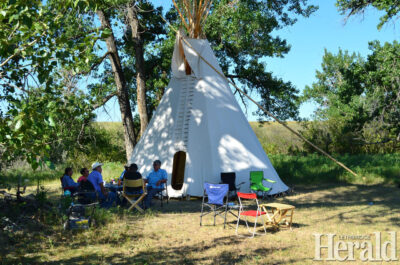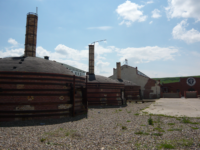Healing camp provides pathway to recovery
By Lethbridge Herald on August 17, 2022.
 Herald photo by Ry Clarke
Kii Mah Pii Pii Tsin Healing and Recovery Camp staff sit under the shade of poplar trees next to a teepee Wednesday on the Blood Tribe Reserve.
Herald photo by Ry Clarke
Kii Mah Pii Pii Tsin Healing and Recovery Camp staff sit under the shade of poplar trees next to a teepee Wednesday on the Blood Tribe Reserve.Ry Clarke – LETHBRIDGE HERALD – Local Journalism Initiative Reporter
Alvin Mills’ Kii Maa Pii Pii Tsin (Kindness to Others) Healing and Recovery Camp is helping people battling addiction recover using traditional Blackfoot culture and healing with a space on the Blood Tribe Reserve just outside Lethbridge.
The camp, which has been operating for two weeks now, is being administered by the City of Lethbridge, along with $120,000 in funding through Ottawa’s Reaching Home – Indigenous and Designated Communities Grant. The camp is a three-month pilot project running seven day camps for everyone, with participants required to be clean for a period of four days before being admitted to Mills’ program.
“With the City of Lethbridge endorsing the concept of Blackfoot healing that’s a huge milestone. And that’s a great step towards the reconciliation that everybody’s striving for, the Truth and Reconciliation. I am a survivor of residential schools. I spent 14 years in residential schools. Given what I went through, I believe reconciliation is something that needs to be always pursued. Not just non-Indigenous communities, the reconciliation must also be amongst the Indigenous communities themselves,” said Mills.
“The recovery program has never been done before. To my knowledge, this is a first of its kind that’s been started. It’s coming from the Indigenous aspect of healing. That’s what we’re striving for. What happens in the city, they have good intentions, but the drug use is always nearby. Here it is pure,” said Mills. “All my staff have signed consent forms, where they’ll be providing drug screening. I think we’re the only service providers that have done so at this point. Even though we’re grassroots, we want to run our program with structure. We have to make sure we’re on the up and up.”
With five participants currently at the camp and more arriving on Sunday, the camp brings together people of all races, genders, and issues looking to explore alternatives to how recovery is handled.
“We want to focus on the ones struggling in Lethbridge. There’s a lot of individuals that we want to try and reach. Give them that compassion, that dignity. Regardless of the choices that they make, the lifestyles that they live, we’re going to give them a sense of empowerment. Here at the camp, they’re going to have a sense of belonging, they’re going to be encouraged to live a healthy lifestyle. With Blackfoot culture, beliefs and customs playing a large part in the role,” said Mills.
“In our culture, there’s a lot of emphasis on the metaphors, the philosophy, and the storytelling. Mostly it’s about honesty, and the truth. In our way, our life, everything is a part of nature. We really respect this area,” said Elder Stamisina, working with Mills’ camp to help share his wisdom and teachings to aid in the recovery process. “Many years ago, we would know all kinds of medicines that are out here, and we would utilize them. But today most of us have lost that knowledge. Here, now, this is just the beginning of reviving where we come from. I’ve always had a dream that someone would find a way of going back to the old traditional ways and this is what the long-term goal is. To bring tradition back and give our people hope that our ways are not completely lost. Helping with healing.”
The camp looks to mix traditional Blackfoot healing with modern practices of addiction counselling, understanding the ways addictions take a hold of an addict’s life and working to instill both methods into a new form of treatment.
“They are allowed to use suboxone, they are allowed to use the methadone. As service providers in the recovery field, we have to recognize methadone and suboxone as tools. Because when somebody struggles with opioids, they can’t get up the next morning and say ‘Okay, I quit.’ It’s a long process,” said Mills.
With the camp opening the goal of Mills is to see recovery grow and progress, while looking to expand further and add more to the camp.
“As this camp goes along, we are going to be starting a stabilization camp, we do have another site in mind. There, our intention is if someone wants to stay here, we don’t want to let them be turned away. If they’re serious about recovery then we’ll transition them to the stabilization camp, where they can stay until we get them into a treatment facility,” said Mills.
“To start this process of healing, for a lot of the ones that struggle with addictions, they have unresolved trauma, they have grief, they have lost loved ones. That’s what keeps them in this, this vicious cycle of addiction where they numb their feelings by the use of drugs. But once they get here, they will be able to address that trauma into being a healthy spirit,” said Mills.
14-13



